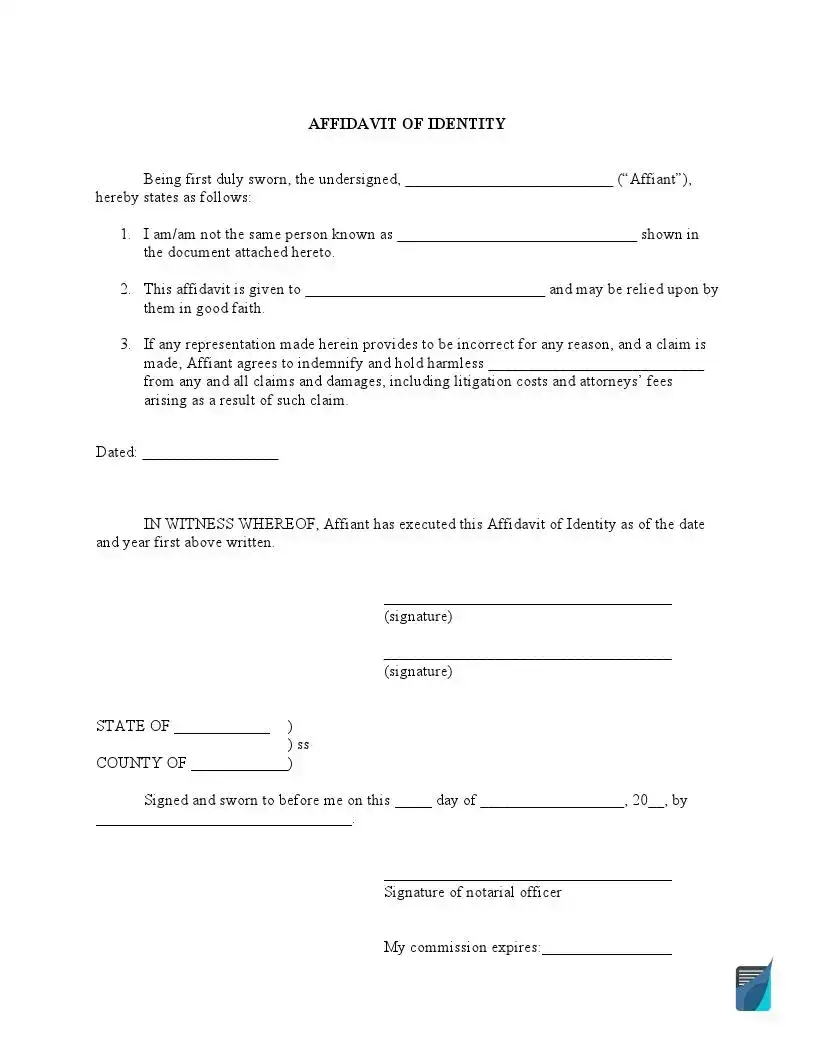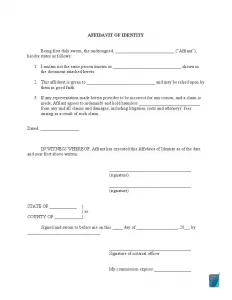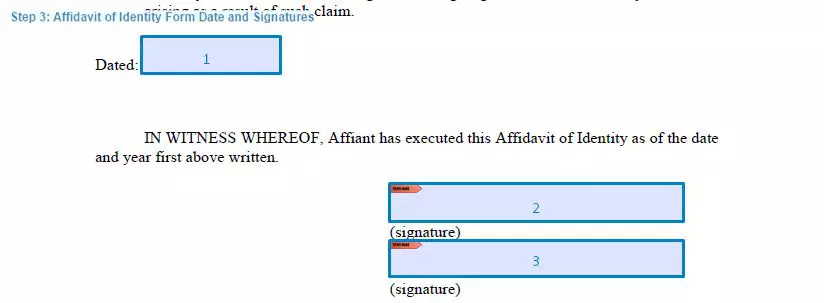Affidavit of Identity
An affidavit of identity is a legal document that is used to confirm the identity of a person making a sworn statement. Essentially, the fillable affidavit form lets an individual prove they are who they are. The affidavit is aimed at eliminating the risk of facing fraud or identity theft and helps governmental and business entities not only take the person’s word but use a legal identity-proving tool.
The two main purposes of creating an affidavit of identity are to authenticate the identity of a person and verify their signature.

Build Your Document
Answer a few simple questions to make your document in minutes
Save and Print
Save progress and finish on any device, download and print anytime
Sign and Use
Your valid, lawyer-approved document is ready
When Might You Need an Affidavit of Identity?
An affidavit of identity might be needed in plenty of situations:
- for a certain category of court cases
- for a certain type of bank transactions
- in situations between business and customers
- when you create documents for guardianship
- when you create a power of attorney
- when filing for elective office, etc.
Another category of situations where an affidavit is an essential legal document is being a victim of identity theft, for instance, a driver’s license or ID theft. Then, the document helps properly file state income tax returns when dealing with credit agencies or law enforcement agencies, etc.
Circumstances where an identity affidavit is needed might vary and commonly, governmental and business entities notify applicants of the need to provide this legal document for a certain type of transaction or deed.
What Should You Include in an Affidavit of Identity?
There is a minimum number of details that should be included in every identity affidavit. Among them are:
- The complete name of the affiant
- The affiant’s date of birth
- Address of the affiant
- The legal document that is used for identification of the affiant
- The affiant’s signature
- The notary’s signature and seal
If the legal document is created for the purpose of alleging fraud, an SSN or its last 4 digits might be needed as well.
What If I Don’t Have an Affidavit of Identity?
If you don’t have this legal document, it might result in governmental bodies or business entities being unconfident about your identity or having your legitimate signature. In some situations, the lack of an affidavit of identity might lead to blocking certain transactions or not reaching the needed results.
Here are some of the situations when the absence of this legal document might result in time and financial expenses.
- When somebody steals a person’s identity and the individual wants to file a claim with a governmental agency or credit organization. Without an affidavit, a claim will look untruthful.
- When a person wants to prove they are a real owner of an account at their bank. If a bank requires an affidavit of identity and the identification process fails, the financial entity might not allow access to their bank account.
- When an individual tries to get a mortgage. If a bank cannot make sure that a person is using their true name, a person will not be loaned big amounts of money.
- When a person is a participant in a lawsuit. Identification might not be completed without this proof of identity, and a court might not let an individual proceed in the court process.

How to Fill Out an Affidavit of Identity?
An affidavit of identity is an easy-to-fill legal document. You can use our free affidavit of identity forms that come in three formats — PDF, DOC, or ODT.
Step 1 — Information about the affiant
An affidavit of identity should start with you stating your name. A similar sentence might be used: “Being first duly sworn, the undersigned, [Name of the affiant] (“Affiant”), hereby states as follows.”

Step 2 — Statements
Further, the statements you swear about should be included. The first one has to state that you are who you are. You might use the statement: “I am/am not the same person known as [Name of the affiant] shown in the document attached hereto.”
Next, you should specify who will get your affidavit of identity — a governmental or business entity: “This affidavit is given to [Name of the Recipient] and may be relied upon by them in good faith.”
After that, you should include the statement that if any information provided in the affidavit turns out to be incorrect, you agree to hold harmless the recipient from any legal claims. One of the best wordings is: “If any representation made herein provides to be incorrect for any reason, and a claim is made, Affiant agrees to indemnify and hold harmless [Name of the recipient] from any and all claims and damages, including litigation costs and attorneys’ fees arising as a result of such claim.”

Step 3 — Date and Signatures
The date of the affidavit should be put next along with the following statement: “IN WITNESS WHEREOF, Affiant has executed this Affidavit of Identity as of the date and year first above written.” Then, you have to put your signature in the affidavit.

Step 4 — Notary acknowledgment
Lastly, the affidavit should be notarized. In a free form that you can find on our website, there will be a specific section for notary acknowledgment that is filed by a notary public. It should mention the state and county of executing the affidavit, the statement about the affidavit being signed and sworn to the notary, and their signature and the date of their commission expiration.

Some Questions Regarding an Affidavit of Identity
Do affidavits of identity expire?
No. Once you created this legal document, it will be valid for an unlimited period of time. At the same time, affidavits might slightly differ in terms of the contents, which is why different life situations might call for the need to create several affidavits of identity for each of them.
Is it necessary to include the date of birth, address, and SSN in affidavits?
Yes. The main purpose of this legal document is to verify the affiant’s identity and signature, and specifying information that is known only to the affiant facilitates the identification process. It is especially relevant for those affiants who have common names, such as James Williams or Tom Johnson. The personal information included in the document will let distinguish people with the same names from each other.
What does a notary do with affidavits?
Once you get to a notary public with the affidavit of identity, they will ask you to provide proof of identity issued by the federal or state government such as your driver’s license or birth certificate.
Review the document for authenticity, absence of signs of forgery or alteration, and legitimacy. They will also confirm that you and the person pictured in the document are the same individuals.
After reviewing your identification document, they will witness you signing the document by signing and stamping it themselves.
Should I fill in the document before getting a notary acknowledgment?
No. You might put your name, address, and other needed information in the legal document. It is the notary who needs to witness it which is why you should first see the notary and only then sign the affidavit.
Is there a standard affidavit of identity form?
No, the format of the document is optional, but some states such as New Jersey might offer their free forms. To avoid the need to look for the documents on the internet, use our free form that can be downloaded and filled out in minutes.